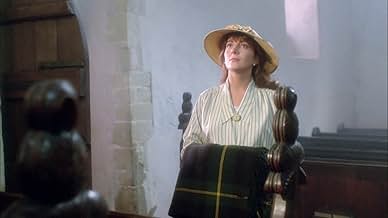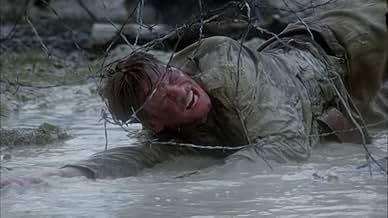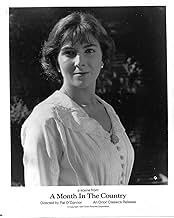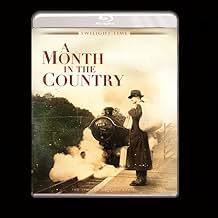IMDb RATING
6.8/10
2.2K
YOUR RATING
Two soldiers (Colin Firth, Kenneth Branagh) recover from World War I while spending a summer in a Yorkshire village.Two soldiers (Colin Firth, Kenneth Branagh) recover from World War I while spending a summer in a Yorkshire village.Two soldiers (Colin Firth, Kenneth Branagh) recover from World War I while spending a summer in a Yorkshire village.
- Awards
- 1 win & 1 nomination total
Ken Kitson
- Mr. Sykes
- (as Kenneth Kitson)
- Director
- Writers
- All cast & crew
- Production, box office & more at IMDbPro
Featured reviews
I saw this film probably 15 years ago, and have never forgotten it. It's about two World War I soldiers who are recuperating at a church. The one is trying to find the remains of the local priest - it's been a while so my brain's a bit rusty - and the other is revealing a mural on the church wall. There's also a love story/triangle to it. It is fabulously acted and demonstrates the horrors faced by men during war time. Kenneth Branagh's performance is worth the price of rental alone. Colin Firth manages to act for a change, rather than seem like he's sleepwalking. (Check out Apartment Zero, another older and decent film.) Exceptional!
This is a true gem of a film. Only those however who have an empathy for the destruction of World War One, and a sensitivity about how moving religious themes can be, will really appreciate the aspects of the film which make it timeless. It is deliberately slow and careful in its pace, and the contrasts between Church and Chapel, working and upper class, and social mobility makes it a film I have always found very moving. The use of the Schubert Mass as a musical backdrop at key points emphasises the cathartic journey Birkin makes. Indeed, his visit to the church as an old man demonstrates the way he has been cleansed of the mud of Flanders.
This pastoral English period piece must be one of the quietest anti-war movies ever made, with a single gunshot heard throughout the entire film (except for the brief battleground flashback before the opening credits), and fired only by a sportsman. But its effect is no less traumatic on the shell-shocked protagonist: a veteran of The Great War taking refuge, after the Armistice, in an isolated English village, far away (except in his nightmares) from the trenches. Hired by the local church to excavate a medieval mural above the alter, he uncovers, in no particular order: an age-old mystery; a bittersweet attraction to the vicar's young wife; a kinship with another ex-soldier (Kenneth Branagh, pre-'Henry V') and, finally, some of the dignity he lost in battle. Don't expect any grand gestures from the leisurely told story. Any positive response to the film will depend entirely on a tolerance for such anachronistic virtues as forbearance, charity, and forgiveness.
It's a love story about rebirth and self healing. The foundation of the plot seems very simple: a young man comes in a town to clean the wall of a church. With a subject like that it could be absolutely boring...but it's not. "Emotion" could be the word to describe it all, though "repressed emotion" would be even more accurate. It's a delicate movie, with thousands of details you might not see the first time; it's deep and truly is a masterpiece in its genre.
Of course to appreciate it you must love repertoire movies. It's not a blockbuster movie...far from that. You must be in a slow mood I guess to enjoy it.
This is the kind of movie I would like to keep in my collection: isn't it a pity that "anonymous" has probably sold his tape already? (I cannot find it in Montreal!)
Of course to appreciate it you must love repertoire movies. It's not a blockbuster movie...far from that. You must be in a slow mood I guess to enjoy it.
This is the kind of movie I would like to keep in my collection: isn't it a pity that "anonymous" has probably sold his tape already? (I cannot find it in Montreal!)
I adored the book by J. L. Carr, and was skeptical that Birkin's first person narrative could be conveyed on film. Firth brilliantly makes this internal landscape manifest, while the film provides a sumptuous external setting. All the lead cast strike an effective balance between intensity and restraint. Every time I view the movie, I see things that I hadn't noticed before.
I wish I had seen "A Month in the Country" on the big screen when it was released. The laserdisc looks good, though I wonder what I'm missing. Even though the laserdisc soundtrack is monophonic, it was striking enough to make a friend jump when we were viewed it.
I wish I had seen "A Month in the Country" on the big screen when it was released. The laserdisc looks good, though I wonder what I'm missing. Even though the laserdisc soundtrack is monophonic, it was striking enough to make a friend jump when we were viewed it.
Did you know
- TriviaFilm historian Nick Redman mentions in his commentary included in the BFI edition of the movie that, at the time of its original release, this was said to be a movie "starring two nobodies".
- GoofsAccording to Alice Keach, her roses are the variety Sarah Van Fleet. However, the film is set in 1920 and Sarah Van Fleet roses were not introduced until 1926.
- Quotes
Reverend Keach: Mr. Birkin, you should know here and now that you employment here does not have my support. But as the solicitors refuse to pay out the £1,000 bequest to our fabric fund until your job is finished I have no choice.
- How long is A Month in the Country?Powered by Alexa
Details
Box office
- Gross US & Canada
- $443,524
Contribute to this page
Suggest an edit or add missing content






























